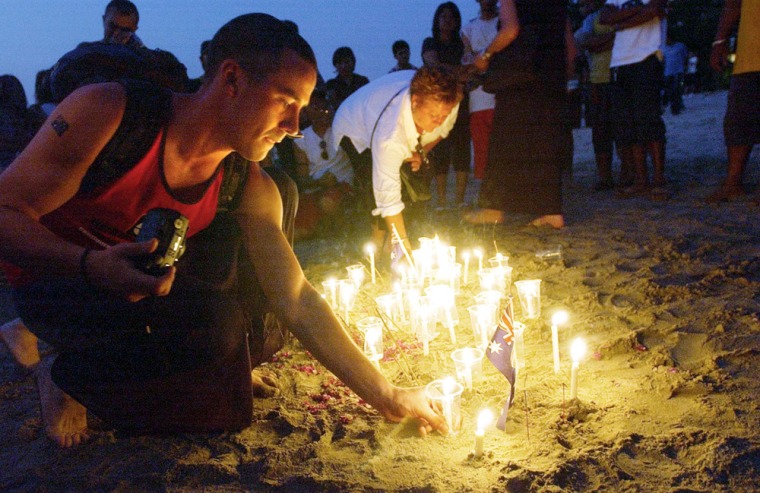With snipers watching and police helicopters buzzing overhead, hundreds gathered Tuesday at the site of the 2002 Bali bombings to mourn the 202 killed and to send a defiant message to the Islamic extremists behind the strike.
Most of those attending the sunbathed ceremony were Australian relatives of the victims or survivors of the Oct. 12 blasts. Several hundred tourists also were present.
Victims of the bombings at the two packed nightclubs came from 22 countries. Eighty-eight were Australians. Seven of the dead were Americans.
Similar memorial services were held across Australia and in England.
“Two years ago terrorism touched Australia in a way that it never has before and we hope never again in the future,” newly re-elected Prime Minister John Howard said at a solemn commemoration in Canberra.
In London, 48 amateur sailors divided by nationality and religion united to guide a 197-foot ship up the Thames River, completing a voyage to promote cultural understanding and honor British victim Daniel Braden of Brighton, England.
The Prince William docked alongside the retired battleship HMS Belfast around noon. An evening memorial ceremony for victims of the bombing was planned aboard the Belfast.
The Bali ceremony proceeded despite last month’s deadly suicide bombing of the Australian Embassy in Jakarta and police warnings of more planned attacks.
Security measures also included armored vehicles that blocked the narrow lanes leading to the site in the heart of the island’s tourist district.
Flowers with orchestra
Mourners filed past a monument engraved with the names of the dead close to the empty lots where the nightclubs once stood. They then tossed white flowers into a small pool as a traditional Balinese orchestra played.
“I have come back to pay my respects for the people who didn’t come home,” said Australian survivor Peter Hughes, who suffered serious burns in the attack.
Jemaah Islamiyah, a terrorist group with ties to Osama bin Laden’s al-Qaida network, was blamed for the embassy attack and the Bali blasts, as well as the Aug. 5, 2003, bombing at the J.W. Marriott hotel in Jakarta that killed 12 people.
“We are not only here united in our grief and sympathy but in our determination to eradicate this evil from our world,” Australian Ambassador David Ritchie told the mourners. “I want to assure (Indonesian) President-elect Susilo Bambang Yudhoyono and all Indonesians that we Australians will support you and be with you in this battle for as long you need.”
Western governments hope that Yudhoyono, who takes office Oct. 20, will bring a more effective leadership in the fight against militants. The retired general coordinated the country’s post-Bali terror crackdown.
Tears at ‘Waltzing Matilda’
Many wept as they listened to the Australian national anthem and a version of the popular Australian folk song “Waltzing Matilda.”
At sunset, some 50 surfers paddled out to sea off Kuta beach to hold their own memorial service. On the beach, hundreds lit candles and said prayers for the dead.
The Bali bombers said they were avenging the U.S. government’s support for Israel and its attacks on Afghanistan and Iraq.
Bali courts have sentenced 35 militants in connection with the blasts, including three who were sentenced to death. More than 100 other extremists with suspected links to Jemaah Islamiyah have either been convicted or are awaiting trial.
Two extremists still at large
But two top Jemaah Islamiyah leaders — Malaysians Azahari bin Husin and Noordin Mohamed Top — remain at large. They are blamed for masterminding the embassy and Marriott blasts and playing key roles in the Bali blasts.
Before the bombings, Bali, which is mostly Hindu, enjoyed a reputation for peace and tranquility, an exception in a country wracked for years by ethnic and separatist violence. It had long been popular with foreign tourists, especially backpackers.
Tony Perkins, from Sheffield, England, lost his 20-year-old daughter, Natalie, and a niece in the attack. The two women were six weeks into a round-the-world trip.
“This is where my daughter is. This is where she died and where her soul is,” he said. “The sad thing about it all is, they should have flown out the Saturday morning before the bomb, but they were enjoying themselves that much here they decided to stop over for a bit longer.”
